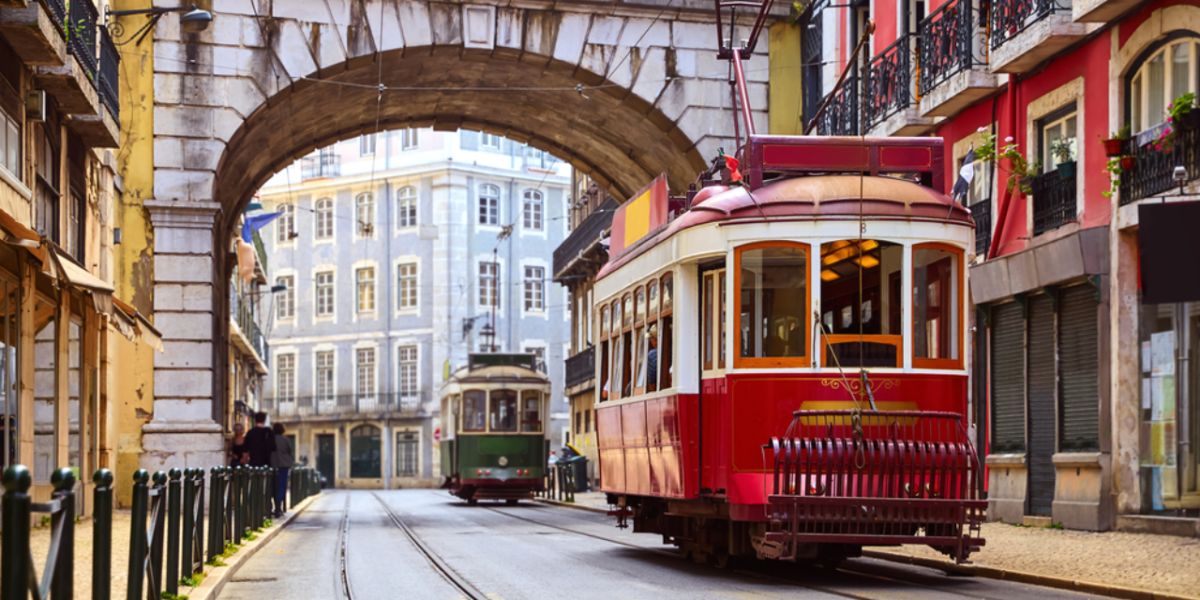
Got your move to Lisbon all sorted out but are scared that you might have missed some key information? We get it! Taking the step to become an expat can be a nerve-wracking decision, especially when it comes to work expectations, accommodation search, logistical/bureaucratic hurdles and potential cultural faux pas. Luckily, we're here to help – so here are some quick facts you should keep in mind when moving to Lisbon!
Lisbon is going through a massive housing crisis
Sadly, Lisbon currently sits among the most expensive cities in Europe to rent. In fact, according to the Housing Anywhere International Rent Index, average rent prices for an apartment in the city in the first quarter of 2025 hover at around €1750, while a small studio will set you back €1056/month. Although rent prices went down by 2% compared to 2024, these figures are still higher than the likes of Paris, Berlin, Madrid or Milan. Unfortunately, things aren't looking any better outside the downtown area, where prices for renting a modest bedroom in a shared apartment can currently set you back 490€/month (a 6.6% drop from 2023). Furthermore, new leasing contracts signed in May 2025 have shown that rent prices have gone up 4% compared to May 2024, reaching an average of €22,40/month per square meter.
As for buying, the average square meter price in Lisbon has increased from € 1,300 to a staggering € 4,360 since January 2015. In central Lisbon, in neighborhoods like Baixa, Bairro Alto, Chiado and Rossio, property prices have risen to 5,720€ per square meter (May 2025 figures), an extraordinary 160% leap in just a little over 10 years! According to statistics from Imovirtual, one of the country's largest real estate portals, the average listing in Lisbon costs 650,000€, a 33% increase compared to 2024. To try to put a stop to price escalation, the government suspended the Golden Visa Scheme program in Porto, which allowed foreign investors to live legally in the country and apply for citizenship after 5 years if they bought 500,000€ worth of property.
To try to lower the weight of taxes on homebuyers, the government approved a new legislative package in 2024 seeking to support people under 35 to buy their first homes. As many people struggled to leave their parent's nest due to house prices, legal residents (foreigners included) between 18 and 35 can now rely on the State to finance up to 10% of the property price. Furthermore, this new legislation exempts new buyers from most taxes related to the process of buying a home, such as the IMT (tax over property transactions) and its respective stamp duty. As expected, this created a spike in demand, driving home prices even higher.
Most locals in Lisbon aren't too fond of digital nomads
Considering this is one of the most expensive cities to buy or rent property in all of Europe, it's no surprise that a lot of locals look at immigrants and digital nomads as scapegoats. Between 2021 and 2023, there was an uptick of 75% in the number of digital nomads arriving in the city. Immigration also skyrocketed during the same period. Though official numbers are hard to come by, it is estimated that over 1,500,000 foreigners are currently living in Portugal, with about 50% of them settling in the capital.
Furthermore, tourists seem to love this city, with more and more hotels and tourist apartments (Airbnb) taking up space that could have been used to accommodate locals. As one might assume, this dangerous concoction has created a lot of resentment among the Portuguese, especially in Lisbon. With the influx of so many people and a predictable spike in demand for housing, local authorities haven't been able to build enough public housing or encourage private enterprises to build houses, apartments and condos for the middle and lower classes. As a result, locals are finding themselves kicked out of their city due to the government's inefficiency and lack of commitment to solving this issue. Unfortunately, this ends up leading to an overall poor attitude towards expats, immigrants and tourists. Though it is by no means dangerous, there may be some instances where you actually feel a certain hostility towards outsiders.
Lisbon is the third sunniest capital in Europe
Sitting only behind the cities of La Valletta (Malta) and Nicosia (Cyprus), Lisbon enjoys over 2,800 hours of sunshine per year. That's almost 8 hours of sunlight per day!
In fact, this is easily one of Lisbon's most striking and recognizable features, as the city is known for its pleasant weather and for the insanely picturesque way it brightens up under the sun. Sure, the staggering number of sunshine hours helps, but Lisbon also benefits from its ancient architecture. As the pavement is covered in traditional calçada portuguesa and most façades are painted in bright, light colors, enhanced with details in tile and limestone, the whole downtown area reflects the light it gets from the sun, giving it an extra kick your camera lens is going to love!
You can witness the tallest waves in the world on a day trip from Lisbon
Though not nearly as popular as football, surf has its fair share of fans in Portugal. In fact, the sport has been growing rapidly in the country, partially fueled by the iconic “Canhão da Nazaré”. If you've never heard of this place, it refers to a geological feature that can be found in the seaside town of Nazaré, just a little over 100 km away from Lisbon.
Taking the shape of an underwater canyon, the area is famous for the formation of the tallest surfable waves in the world! In fact, out of the 7 tallest waves ever surfed, 6 of them were recorded at the Canhão da Nazaré (more specifically at Praia do Norte). Currently, the world record belongs to German surfer Sebastian Steudner, who surfed at a 28-meter wave in Nazaré back in 2024.
Obviously, this specific location should only be attended by surf pros. However, there are plenty of other beaches in Nazaré where you can give surfing a go. On the other hand, if you don't want to venture that far away from Lisbon, there are many beaches within 30 minutes where you can rent a surfboard or find a school, like Carcavelos, Cascais and Estoril.
Greetings in Lisbon
We all know how weird it can be when you meet someone new and aren't exactly sure of how to greet them. When you factor in the different cultural nuances and traditions, the potential for awkwardness skyrockets!
Depending on the nature and setting of the interaction, the way you greet people may differ. If we're talking about work or a more formal meeting, a firm handshake is considered the norm. However, if it's a more laidback setting, and even if you're meeting that person for the very first time, Portuguese people usually go with two kisses on the cheek (man-woman, woman-woman) or even a hug (usually between men only).
Lisbon experienced a devastating earthquake… and it's bound to happen again!
Lisbon is undoubtedly beautiful, but the city you see and experience today is largely the result of the rebuilding efforts undertaken by Marquês de Pombal in the 18th century. That's right – by European standards, Lisbon is actually quite modern! Unfortunately, the reason why medieval Lisbon largely disappeared is no laughing matter. In the morning of November 1st, 1755, the city woke up with an earthquake of biblical proportions, followed by a tsunami and a massive fire that pretty much destroyed all the infrastructure and killed over 10,000 people.
No measuring techniques had been developed back then, but it is estimated that the Lisbon earthquake hit 9.0 on the Richter magnitude scale.
In fact, this was actually the first earthquake to be scientifically studied, marking the event that led to the development of modern seismology and earthquake engineering. Although over 250 years have passed, the event is still deeply ingrained in the population's collective memory, partially because another massive earthquake is bound to happen someday. Since Lisbon sits at the complex boundary between the Eurasian Plate and the Nubian Plate, this location is classified as an area of high seismic activity. While it's true the “new” city was built to withstand future earthquakes, the renovation came at a time when seismic engineering studies were still in their early stages, so there's really no guarantee the city won't experience a similar level of destruction.
Lisbon locals like to take it slow
If you are originally from a big metropolis, don't expect the same fast-paced environment in Lisbon. Despite being a capital - and the biggest city in Portugal - Lisbon is considerably smaller when compared to other capitals around the world, which definitely reflects in the lifestyle.
Plus, the local culture also encourages people to take things slowly. Why do it all today when you can simply take longer? Well, that's sort of the mindset around here, where nothing seems to spark an imminent sense of urgency – It's both a blessing and a curse! If you're in a hurry, a “com licença” (excuse me, in English) will do the job. However, as a general rule of thumb, don't expect anything to be taken care of quickly (or efficiently).
Don't mind the tourists in Lisbon
Tourism is one of the main features of Lisbon, which is already considered one of the leading destinations in Europe.
Although the city is extremely popular all year round, expect larger crowds during the Summer, especially around the city center and in neighborhoods such as Baixa, Bairro Alto, Cais do Sodré, Graça and even Belém. They're enjoying this beautiful city the same way you do - so help them if anyone stops you for directions, and try not to photobomb any selfies. That, or simply avoid the busier locations altogether (easier said than done!).
In Lisbon, most social functions take place around the dinner table
Although this trend is growing (we are a wine country, after all), most Portuguese people don't really have the habit of hitting wine bars when meeting up with friends. When the time comes to socialize, they would rather gather around a dinner table, whether at a restaurant or at home. As such, food is an integral part of interacting with others in Portugal. You don't necessarily need to set up a banquet, but if you're having some Portuguese friends over, make sure to at least have something they can sink their teeth into.
As an equally viable alternative, most Portuguese people (especially younger generations) very much enjoy hanging out at cafés, ordering an espresso and sitting at a table for hours on end while catching up. Funny enough, it's quite the other way around for older folks, who usually take a more pragmatic approach to coffee. They walk in, have their cup at the counter, drop some coins and head out to work.
Do not speak Spanish in Lisbon!
In most tourist areas, waiting staff always speak English, so communication will barely be an issue. Even in more traditional and less central places, chances are that you'll find someone who will be able to help you out: so by all means, ask away, as long as you don't do it in Spanish!
Portuguese people are very sensitive about this matter and will not like it if you assume their native language is Spanish. Definitely a no-no! That being said, never say “gracias”. Instead, say “obrigado” (for men) or “obrigada” (for women) when you want to thank someone or show appreciation.
We do our best to provide accurate and up to date information. However, if you have noticed any inaccuracies in this article, please let us know in the comments section below.








